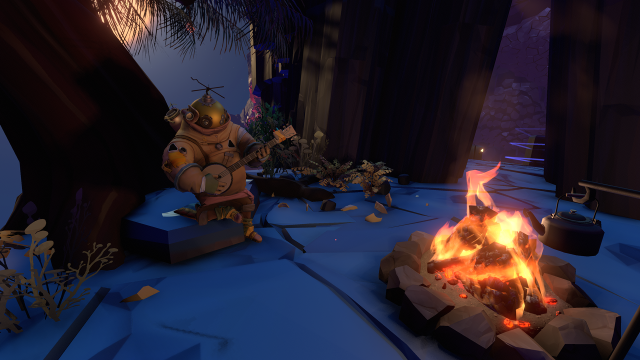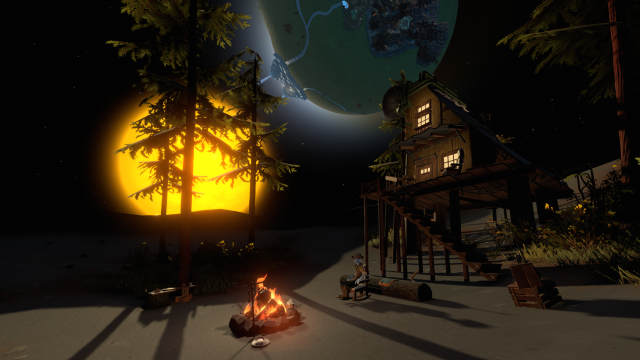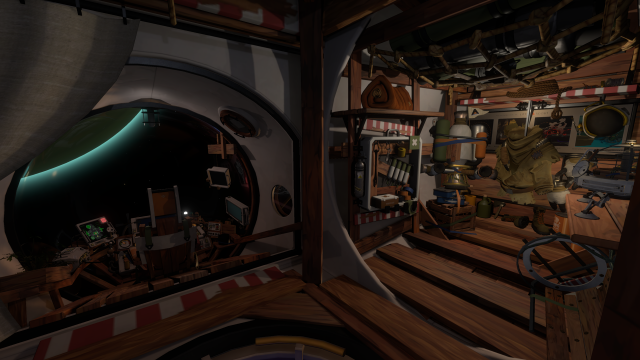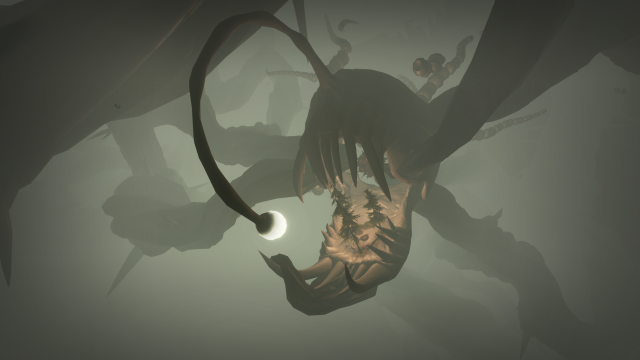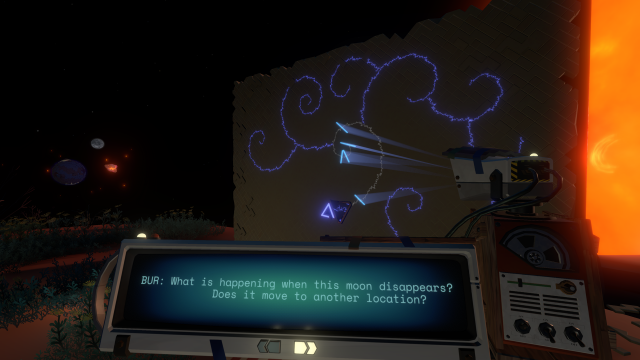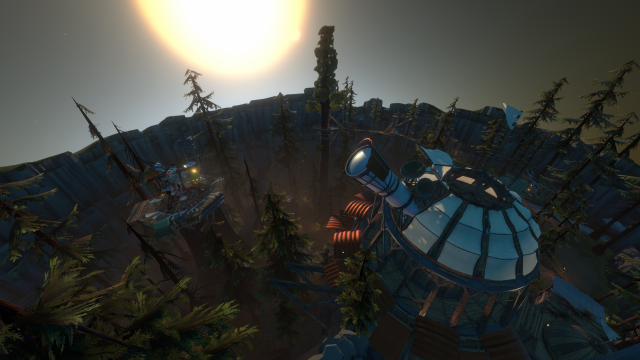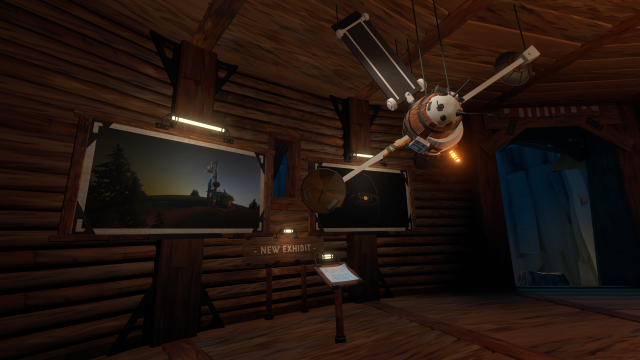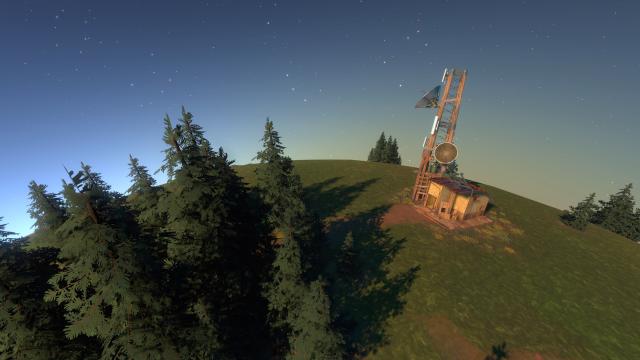An unforgettable adventure, the thrill of piecing together a mystery organically, respecting the player’s ability to creatively problem solve instead of guiding the player through a linear experience
The existential crisis as I ponder the vastness of space and eternity
Welcome to another Backlog Review, where we take a look at an older game that fans might have sitting waiting to be played or are still considering giving a purchase. This time we’re looking at Outer Wilds.
There is a small selection of games that fall into the, “don’t look it up, just play it” category. I’m sure someone has recommended a game like this to you at least once. “You just gotta play it,” they’ll urge without telling you anything about it. These games are best played in ignorance and are often an experience unto themselves. They may even go on to become a pivotal moment in your adolescence that changes how you see games and shapes the kind of gamer you become (see my Thomas Was Alone review). This is an elite group of games. While which games have membership to this exclusive club varies from gamer to gamer, I think most who’ve finished it will agree: Outer Wilds is one of these games. It is an experience. A game best played blind. If you haven’t already been spoiled to the nature and story of this four year old game, I would honestly prefer you to go purchase Outer Wilds right now and enter the handcrafted worlds by Alex Beachum and Mobius Digital than read this review. Consider yourself warned.
I have a personal relationship with this game. I originally started it the same time I was working on a project for my course in public archeology. Simply put, the class had to find a way to educate the public on archeological concepts. Usually this was done in an annual, in-person roadshow, but this was spring of 2020 so we all made digital projects on a shared blog site. I decided to combine archeology and video games. Outer Wilds was a massive piece of inspiration. Though the game is primarily space themed, you are part of an association of astronauts who are also conducting archeology to uncover secrets about a long dead alien civilization. What a concept!
I published my article, which is now gone along with the rest of that year’s projects, but I was invited back a year later to turn my article into a virtual talk. This game catalyzed my hobby of publishing writing work on video games and analyzing their relationship with education and anthropology. Embarrassingly, I actually did this all without ever finishing Outer Wilds. Life of a student, no time for games, what more can I say.
Though I had never finished the game, it was love at first lift-off and I was awaiting the day it would finally land on Switch. Three years later I have finally reached the end of my journey in Outer Wilds. It was worth the wait. When it comes to reviewing a game from four years ago, it’s easy to wonder what hasn’t already been said about an award winning and massively beloved game. While I could focus this review exclusively on how it runs on switch, that would be a short review. I played exclusively in handheld mode and it runs very well. Despite some occasional framerate drops and some drop in, nothing ever hindered my immersion or experience. So, is it a game you should try?
Outer Wilds takes place in a foreign planetary system and on alien planets. The game is about curiosity and how it drives exploration and scientific discovery. It’s about the importance of knowledge. It’s about dead civilizations, culture, archeology, and the importance of connections we make with others. It’s about physics, quantum physics, and astrophysics; it’s about the wonder of infinite possibilities and the unknown. Over the course of your journey, it will turn you into an inquisitive adventurer as you piece together newly discovered clues with previously collected information like a detective or investigative reporter pinning newspaper clippings, polaroid photos, and scribbled notes to a wall while connecting them together with red string. Outer Wilds is a perfect example of why I love indie games.
It all begins with you waking up on your home planet of Timber Hearth the morning of your first space launch. You have no mission, the species you are a part of (a blue-skinned, four-eyed alien) is simply compelled to explore by their own individual motivations. Each of your fellow members of Outer Wild Ventures, your planet’s space association, whose footsteps you are following in, can be found on other planets. Chert wants to catalog the stars, while Riebeck the archaeologist, despite being less adventurous or brave, is driven into space to explore the ruins of a long dead alien species called Nomai that used to inhabit several planets in your planetary system. And you, the player, are motivated by whatever piqued your interest after talking with the residents of Timber Hearth in a cleverly done, seamless (yet totally optional) tutorial. Gamers who prefer more guided and linear games with quests and missions may not find this lack of direction appealing, but Outer Wilds is filled with so many curiosities that confound, it’s bound to galvanize most players to explore and seek answers.
After learning what you can do in the game with your limited, but very versatile, equipment, you’re given free rein to join your fellow space explorers and escape your home planet’s orbit. Your planetary system consists of five (or six depending on how you count the hourglass twins) planets, two moons, and other satellites orbiting your star. Each as unique and imaginative, if not more so, than the words imagined by Antoine de Saint-Exupéry in his novel The Little Prince. Outer Wilds is dreamlike, philosophical, and at times eerie.
The overall wonder and individuality of the planets isn’t just to ogle at, they’re each intricately designed time-based puzzles. These puzzles, however, are unlike the ones in games as players are accustomed to. In Outer Wilds, you are trapped in a 22-minute time loop in a planetary system that is rapidly changing until the system’s star goes supernova and everything, including yourself, is destroyed. Like in Majora’s Mask or the film Groundhog Day, being trapped in a time loop means you become increasingly familiar with your surroundings and where and when specific events occur. Where you explore is just as crucial as when you explore. This clear tie between space and time can’t stop but make us nerds happily think of Hermann Minkowski’s and the 4th dimensional concept that is spacetime.
As mentioned earlier, the game gives you no directives. You play how you want as you follow your curiosity and the questions that come up with each new discovery. Much of what you learn comes from reading messages left behind by the Nomai. This long dead civilization is key to solving the enigma of Outer Wilds. There is lots to uncover. Luckily, key information is saved and organized in your ship’s log.
Curiosity-fueled play in an open “world” game means each player has a unique, personal adventure and their own hypotheses as to what is happening. At the start of the game, my mind was full of assumptions about the Nomai. The more I learned, the more my assumptions evolved and corrected. The design of the game acts as a lesson to remind me to always question my assumptions and focus on observations and facts. I was proud of myself as I reshaped my conjecture into truth with each new piece of information. The game is a great metaphor for the scientific method.
Time is a huge theme and core to the gameplay. While there are moments where you’ll feel pressure from the time crunch, for the most part the game is very relaxed. You explore at your own pace. Because you are stuck in a time loop, you have more than all the time in the world. Though there were moments of anxiety, sweaty palms, frustration, and disappointment as I tried to accomplish something before time ran out, death isn’t too disheartening.
Unlike replaying difficult game level over and over and over again, In Outer Wilds, even if I failed my goal in one time loop, I always learned something new that I could use in the next. Even if it wasn’t a new message left by a Nomai, I may have learned something about the physical nature of this artificial universe, a trick about my equipment, or got a little better at piloting my spaceship.
Death is usually only a brief and minor inconvenience. As you become more familiar with the geography of the game and more comfortable with your inevitable death (dark, I know) you ease into unreserved experimentation. Mistakes are learning opportunities. Answering the question, “what happens if…?” may have just killed you (that’s okay, you’ll die a lot), but maybe it didn’t and you were shocked by what you learned. Progression in this game is unlike any game I have ever played. From the first time I played to the time I finished, nothing in the game changed (other than my notes in my ship’s log). I was what changed. With each loop I learned and grew. Knowledge is all that matters. I love this theme.
The more you play, the more you learn. The more you learn, the better explorer and scientist and problem solver you become. The worlds change from mysterious, chaotic, overwhelming, and dangerous, to predictable and logical. The universe is still uncaring in its factual existence, but familiar. An apt metaphor on how science changes our perception of obscurities, making them less frightening. Outer Wilds is a puzzle game, but it’s not. The puzzles aren’t elements of the game that exist in isolation or feel out of place with the game’s environment as they do in most games, but are integrated into the planetary system of the game.
The actual puzzle is you decoding the game itself and becoming smarter as a result. All this experimentation and information gathering develops organically and leads to creative problem solving. You’ll often need to think outside the box, but you’ll be rewarded with feeling like a genius when the lightbulb over your head lights up. I had some literally jaw dropping moments when I finally solved a mystery that was plaguing my mind. These conundrums will haunt you even after you put down your Switch and temporarily return to our own solar system. But you’ll be back.
Outer Wilds is a game that will stay with me (and not just because I’ve spent hours listening to the soundtrack and it has since turned me on to instrumental bluegrass). I’ve always told friends in my attempts to persuade them to try the game that the tone of Outer Wilds perfectly encapsulates my wonder and love for space and exploration in ways that other mediums fail to.
Unlike other games, movies, and novels, which are almost universally depicted as hightech, cold, void of color, and lifeless, Outer Wilds has forests, roasting marshmallows on a crackling campfire, and satellites made of repurposed wooden barrels. Not the usual uncomfortable, sterile space. The game feels like my summers camping on my uncle’s off-grid property spending my days exploring the woods and my nights lying on the sandy riverbank gazing up at the stars. While these two very different environments may seem dissonant, or even a bit anachronistic, rustic outdoors and outer space, combined in Outer Wilds, they make the exploration in the game feel familiar and nostalgic while also revealing the heart of what it means to be an explorer.
Just like the aliens of Outer Wilds Ventures, humanity is compelled to explore, question, and understand the nature of the universe. The Hearthians explore despite the dangers of cruising the vacuum of space and landing on volcanic moons in wooden spacecrafts cobbled together with alien technology they don’t fully understand and wearing handmade spacesuits torn, patched, taped, and unevenly sewn together. This isn’t as far-fetched as it sounds, as one of my professors and fellow lover of space literally made his own space suit for a fraction of the cost of NASA. If you dream it, you’ll find a way to do it.
Speaking as a previous math and science teacher and someone who’s traveled solo to several countries on different continents, science and exploration isn’t always about doing what’s safest, but instead satiating a need spurred by curiosity. To be human (or Hearthian or Nomai) is to want to understand, learn, and explore what we see. We go “because it’s there.”
I could go on and on with praises for Outer Wilds. The atmosphere, the sound design, the score, the overwhelmingly amazing attention to detail, clever puzzle design, the story. It is magical. Outer Wilds is a must on Switch. Yūgen is a Japanese concept that doesn’t have a direct English translation. It varies, but I particularly like this definition: “an awareness of the universe that triggers an emotional response too deep and powerful for words.” After looking away from my Switch screen once the final credits of the (main) ending finished only to find myself back on Earth in a room that felt too small to contain something intangible, I took a quiet moment to pause and reorient myself in this reality. I think I need some time on the roof to stargaze for a while.
Nintendojo was provided a copy of this game for review by a third party, though that does not affect our recommendation. For every review, Nintendojo uses a standard criteria.




 ShareThis
ShareThis